Nihon Hidankyō receives the Nobel Peace Prize: A recognition for anti-nuclear activism worldwide
The 2024 Nobel Peace Prize has been awardedꜛ to Nihon Hidankyōꜛ, a Japanese organization founded by survivors of the atomic bombings of Hiroshima and Nagasaki. Nihon Hidankyō, also known as the Japan Confederation of A- and H-Bomb Sufferers Organizations, has been at the forefront of nuclear disarmament advocacy for decades. Their tireless efforts in bringing the personal stories of atomic bomb survivors, or hibakusha, to the global stage have played a vital role in educating the world about the horrors of nuclear warfare and the pressing need for complete nuclear disarmament.
 Imagine Peace Ad, Yoko Ono 2024.
Imagine Peace Ad, Yoko Ono 2024.
The origins and mission of Nihon Hidankyō
Founded in 1956, Nihon Hidankyōꜛ was established by survivors of the atomic bombings who united to fight for justice, medical assistance, and the abolition of nuclear weapons. The organization operates on two main fronts: providing support to hibakusha, who suffer long-term health issues due to radiation exposure, and campaigning for the total elimination of nuclear weapons. Its efforts include lobbying governments, testifying before international bodies such as the United Nations, and organizing global movements against nuclear proliferation.

Logo of Nihon Hidankyō. Source: Wikimedia Commonsꜛ (license: CC0 1.0).
The group’s advocacy is rooted in the personal experiences of hibakusha, many of whom still live with the physical and psychological scars of the bombings. They offer a powerful and unique perspective on the inhumane consequences of nuclear weapons. Through their testimonies, Nihon Hidankyō has provided a human face to the often abstract discussions around nuclear policy and deterrence. Over the decades, they have been instrumental in shaping international discourse, pushing the conversation towards total nuclear disarmament rather than merely non-proliferation.
The atomic bombings of Hiroshima and Nagasaki
To understand Nihon Hidankyō’s mission, one must recall the events of August 6 and 9, 1945. On these dates, the United States dropped atomic bombs on the Japanese cities of Hiroshima and Nagasaki, respectively, in the final days of World War II. The bombings resulted in an unprecedented level of destruction and loss of life. In Hiroshima, the bomb known as “Little Boy” killed an estimated 70,000 to 80,000 people instantly, with tens of thousands more succumbing to injuries and radiation sickness in the following months. In Nagasaki, the bomb “Fat Man” killed approximately 40,000 people immediately, with total deaths reaching over 70,000 by the end of 1945.
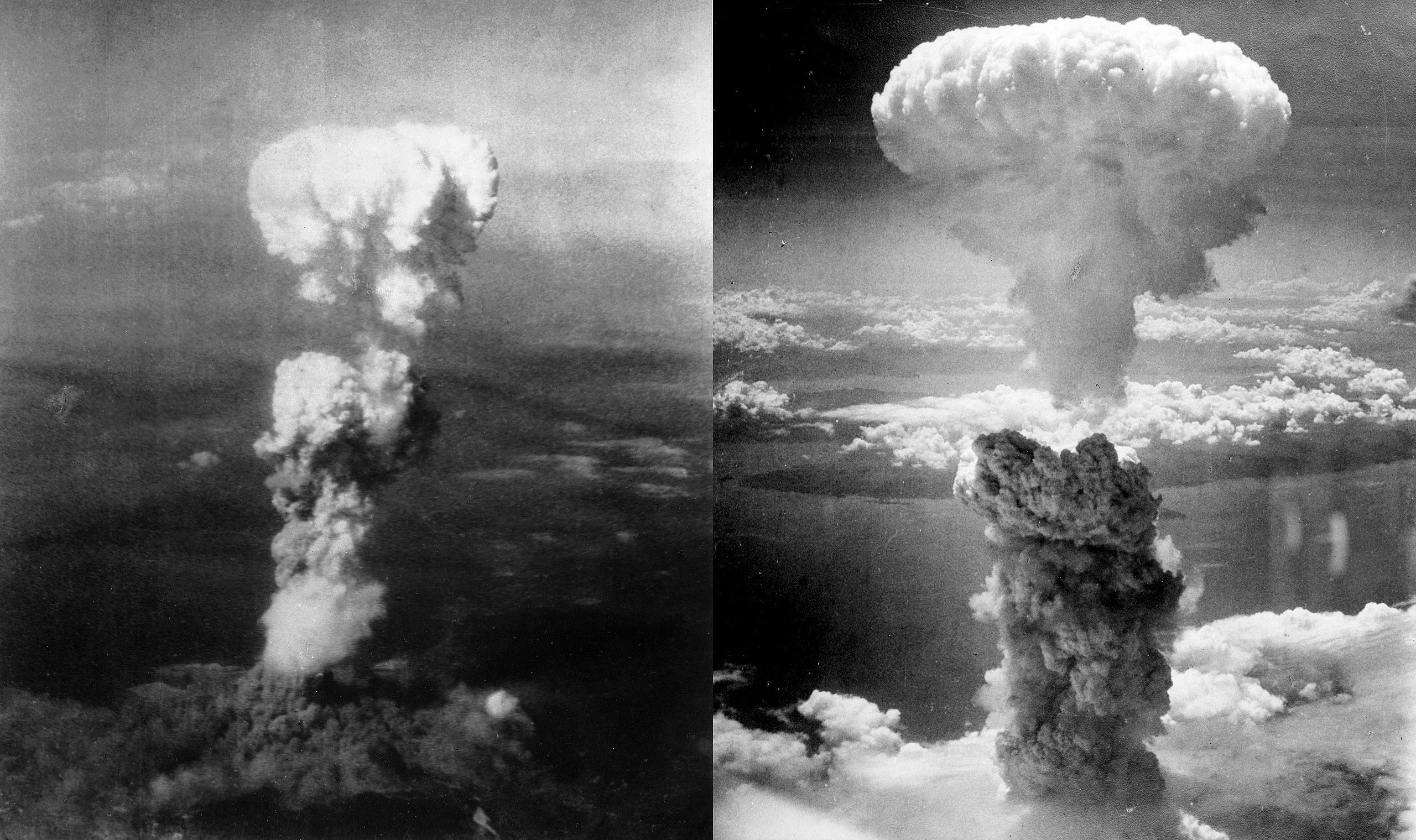 Left: Atomic bombing of Hiroshima on August 6, 1945. The mushroom cloud over Hiroshima after the dropping of the atomic bomb, as seen from the Enola Gay. At the time this photo was made, smoke billowed 6 km above Hiroshima while smoke from the burst of the first atomic bomb had spread over 3 km on the target at the base of the rising column. – Right: Atomic bombing of Nagasaki on August 9, 1945. Source: Wikimedia Commonsꜛ (license: public domain).
Left: Atomic bombing of Hiroshima on August 6, 1945. The mushroom cloud over Hiroshima after the dropping of the atomic bomb, as seen from the Enola Gay. At the time this photo was made, smoke billowed 6 km above Hiroshima while smoke from the burst of the first atomic bomb had spread over 3 km on the target at the base of the rising column. – Right: Atomic bombing of Nagasaki on August 9, 1945. Source: Wikimedia Commonsꜛ (license: public domain).
The bombings left a lasting impact not only on Japan but on global history, marking the first and only use of nuclear weapons in warfare. The devastation caused by these bombs has shaped international relations and military strategies for decades, embedding the concept of nuclear deterrence in global security doctrines. However, for the survivors of Hiroshima and Nagasaki, these bombings represent not military strategy but human tragedy. Nihon Hidankyō’s ongoing work is a testament to the resilience of these survivors and their commitment to ensuring that such horrors are never repeated.


Left: Hiroshima before bombing. Area around ground zero. 305 m circles. – Right: Hiroshima after bombing. Source: Wikimedia Commons 1ꜛ and 2ꜛ (license: public domain).
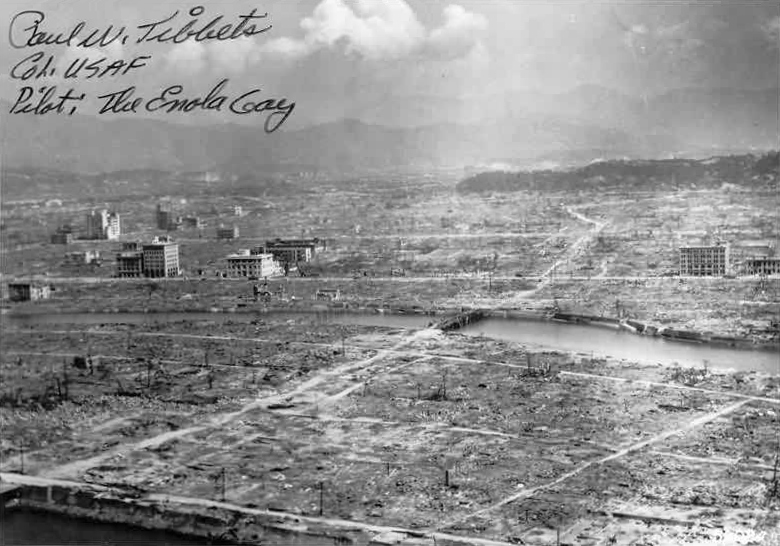 Hiroshima in the aftermath of the bombing. Sometime after the moment of detonation which occured at approximately 08:15 and 43 seconds (local time). Source: Wikimedia Commonsꜛ (license: public domain).
Hiroshima in the aftermath of the bombing. Sometime after the moment of detonation which occured at approximately 08:15 and 43 seconds (local time). Source: Wikimedia Commonsꜛ (license: public domain).
 An atomic bomb victim with whole body burned. August 7, 1945, Ninoshima Quarantine Office, Onuka Masami. Source: Wikimedia Commonsꜛ (license: public domain).
An atomic bomb victim with whole body burned. August 7, 1945, Ninoshima Quarantine Office, Onuka Masami. Source: Wikimedia Commonsꜛ (license: public domain).


Left: The patient’s skin is burned in a pattern corresponding to the dark portions of a kimono. – Right: Elder sister and younger brother who lost their hair by aftereffects of atomic bomb. October 1945, Kikuchi Shunkichi. Source: Wikimedia Commons 1ꜛ and 2ꜛ (license: public domain).
Ethics and implications of the atomic bombings
The decision to drop the atomic bombs has long been justified by the argument that it ultimately saved lives by ending World War II swiftly, preventing a prolonged and bloody ground invasion of Japan. American officials, including President Harry Truman, asserted that the bombings spared countless American soldiers’ lives and brought about the unconditional surrender of Japan. This narrative, however, is deeply contested.
The reality is that the atomic bombings resulted in the deaths of hundreds of thousands of civilians, many of them women, children, and the elderly, who had no direct involvement in the war effort. But it were not only Japanese citizens who perished in the bombings. In Nagasaki, there was a significant number of Korean forced laborers and Allied prisoners of war (POWs) were among the victims. The bombings not only claimed lives but caused untold suffering due to radiation exposure, with survivors experiencing long-term health complications, including cancer, genetic mutations, and mental trauma. These facts challenge the notion that the bombings were a necessary evil to save lives.
Critics argue that Japan was already on the verge of surrender before the bombs were dropped. The country had been ravaged by conventional bombing raids, and its infrastructure was in ruins. Furthermore, Japan’s military and government were increasingly aware of their defeat as the Soviet Union declared war on Japan on August 8, 1945, adding to the already overwhelming pressure. The atomic bombs were not the decisive factor in Japan’s surrender, but rather a demonstration of American military power, particularly aimed at asserting dominance in the post-war order. In this light, the bombings of Hiroshima and Nagasaki appear more as acts of intimidation and political maneuvering than purely strategic military decisions.
A call for nuclear disarmament and an end to war
The awarding of the Nobel Peace Prize to Nihon Hidankyō comes at a critical juncture in global history. Decades after the bombings of Hiroshima and Nagasaki, the world continues to grapple with the threat posed by nuclear weapons. Despite international treaties aimed at reducing nuclear arsenals, many nations still possess these devastating weapons, and the risk of their use — whether by accident, miscalculation, or in conflict — remains dangerously high. Nihon Hidankyō’s work reminds us of the catastrophic human cost of nuclear warfare and the moral imperative to eliminate these weapons entirely.
 Hiroshima and Nagasaki Park in Cologne, dedicated to the victims of the atomic bombings.
Hiroshima and Nagasaki Park in Cologne, dedicated to the victims of the atomic bombings.
The atomic bombings of Hiroshima and Nagasaki should serve as a stark warning about the dangers of war, particularly the use of weapons of mass destruction. The fact that nuclear weapons have not been used since 1945 is no cause for complacency. Instead, it is a call to action. As long as nuclear weapons exist, humanity faces the specter of unimaginable destruction. Nihon Hidankyō’s message is clear: we must work towards a future where such weapons are abolished, and where war itself is rejected as a means of resolving disputes.
In the broader context of warfare, the atomic bombings stand as a chilling example of the moral bankruptcy of modern warfare. War inevitably results in the loss of innocent lives, the destruction of communities, and long-term suffering. The tragedy of Hiroshima and Nagasaki should compel us to question the very nature of war and to seek peaceful, diplomatic solutions to conflicts. The survivors of these bombings have dedicated their lives to this cause, and their message — articulated through Nihon Hidankyō — should resonate with all of us: war is not the answer, and the use of nuclear weapons can never be justified.




 Nuclear weapons memorial in the Hiroshima and Nagasaki Park in Cologne. The inscription reads: “The Hiroshima-Nagasaki Park commemorates the Second World War with its more than 50 million dead and calls for the search for peaceful solutions for the coexistence of peoples. … free of nuclear weapons - now!” and calls for the banning of nuclear weapons.
Nuclear weapons memorial in the Hiroshima and Nagasaki Park in Cologne. The inscription reads: “The Hiroshima-Nagasaki Park commemorates the Second World War with its more than 50 million dead and calls for the search for peaceful solutions for the coexistence of peoples. … free of nuclear weapons - now!” and calls for the banning of nuclear weapons.
Conclusion
The Nobel Peace Prize awarded to Nihon Hidankyō is a recognition not only of their tireless advocacy for nuclear disarmament but also of the profound human suffering caused by the use of atomic weapons. In my opinion, their work is a powerful reminder that nuclear weapons are not just strategic tools but instruments of mass murder that bring unimaginable devastation to innocent lives. The bombings of Hiroshima and Nagasaki were not justified acts of war; they were catastrophic violations of humanity that should never be repeated. As we reflect on the lessons of the past, we must commit ourselves to the abolition of nuclear weapons and the pursuit of peace, for the sake of future generations and, actually, the survival of our planet.
 The Memorial Cenotaph at the Hiroshima Peace Memorial Park. Source: Wikimedia Commonsꜛ (license: CC0 1.0).
The Memorial Cenotaph at the Hiroshima Peace Memorial Park. Source: Wikimedia Commonsꜛ (license: CC0 1.0).
References and further reading
- German news announcement of the Peace Noble Price Award 2024ꜛ
- Wikipedia article on Nihon Hidankyōꜛ
- Website of Nihon Hidankyōꜛ
- history.com on “Hiroshima, Then Nagasaki: Why the US Deployed the Second A‑Bomb”ꜛ
- nautilus.org on “Hiroshima and Nagasaki: There were other choices”ꜛ
- Deutschlandfunk on “Als die Atombomben fielen, lag Japan schon am Boden”ꜛ
- Debate over the bombings on Wikipediaꜛ


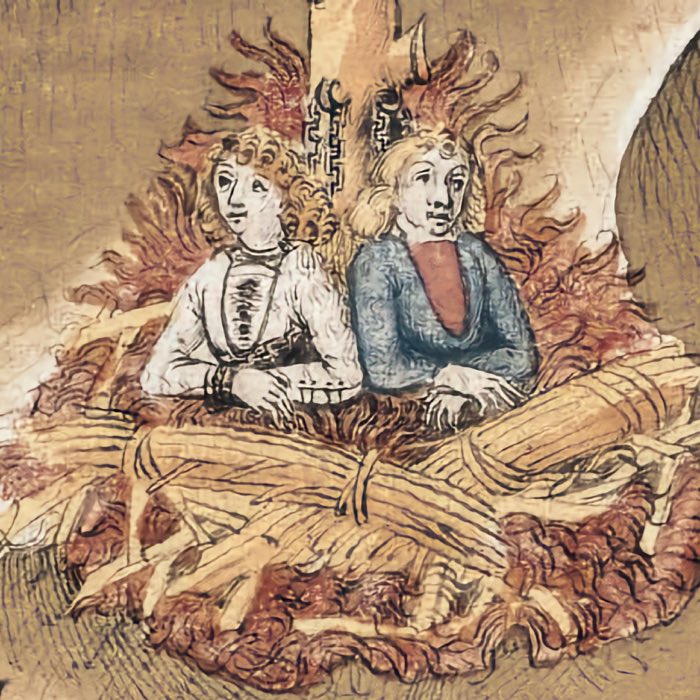
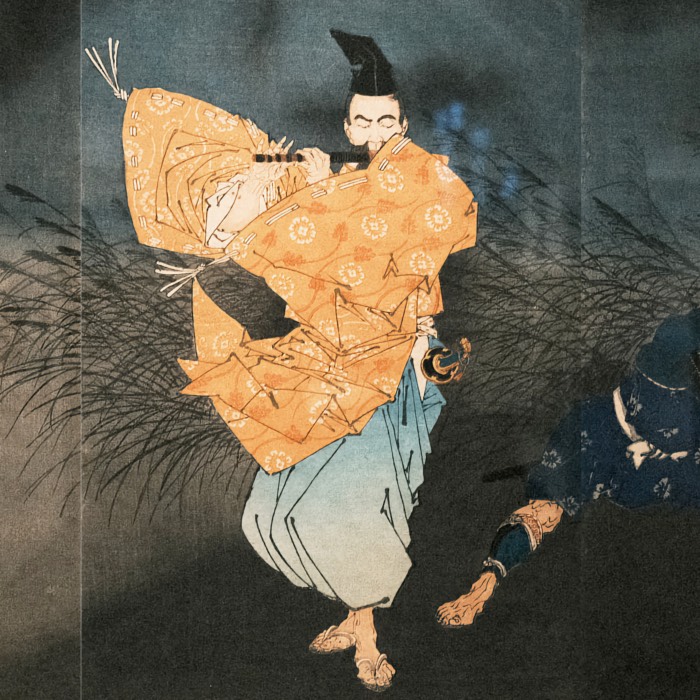

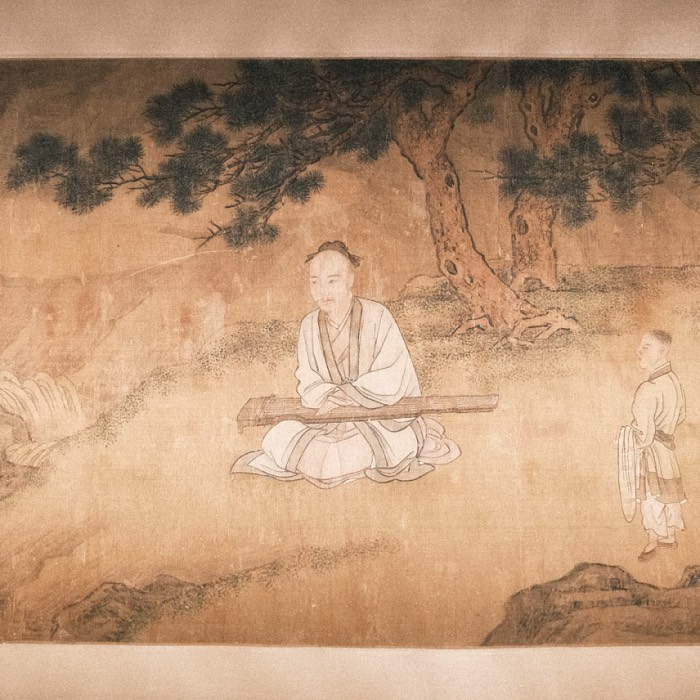
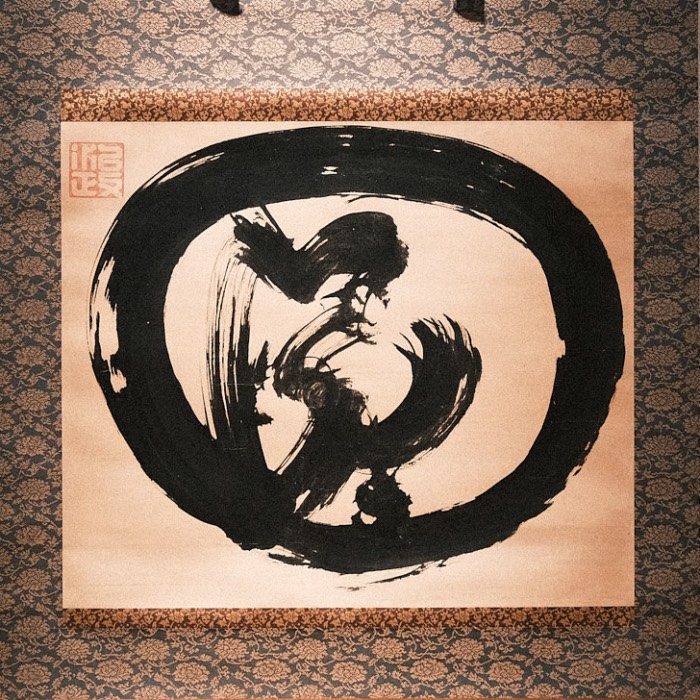
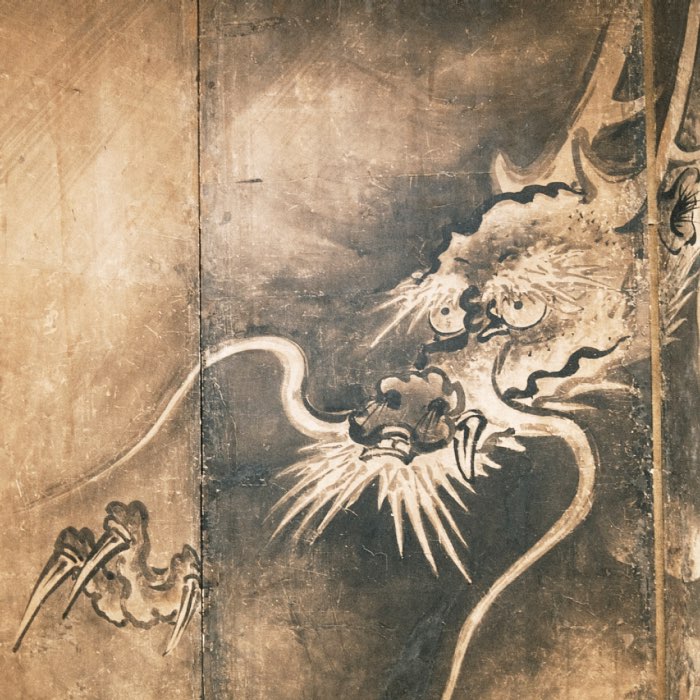
comments